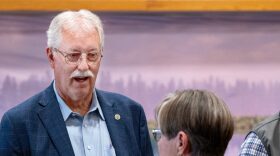Kansas Republican lawmakers want to take over powers from state and local public health officials to fight the spread of contagious diseases.
The Kansas Senate passed a bill to shift those powers from local health officials to state lawmakers last week. It now goes to the House. Democratic Gov. Laura Kelly vetoed a similar bill last year.
If the legislation became law, public health officials could still make recommendations on things like wearing masks and closing businesses. But only the Legislature would have the power to issue public health orders.
“This is all about putting the power where it belongs,” said Senate President Ty Masterson, a Republican from Andover. “Not with an unelected bureaucrat. I don’t care how expert you think they are.”
The legislation marks the latest conflict between Republican lawmakers and public health specialists.
Well into the pandemic, the Legislature essentially stripped some powers from the governor to order shutdowns and other actions aimed at controlling a disease outbreak.
While that struggle played out in Topeka, city and county public health officials found themselves under fire for local orders, like mask mandates, meant to contain the spread of COVID-19.
Now state lawmakers could seize some power from those local public health officials, people they describe as stripping away personal liberties and threatening the economy with restrictions.
“To stand up here and pretend that you all did anything that was effective during that COVID response is ludicrous,” state Sen. Mark Steffen, who sponsored the bill, said during a Senate committee hearing. “If you don’t recognize your inadequacy in the field of public health, recognize it, admit it, regain our trust. Now you don’t have it, and you certainly didn't gain it today.”
Charlie Hunt, the interim director of the Johnson County Department of Health and Environment, said the bill reflects conflicts that grew during the COVID-19 pandemic. He said the measure would make it harder to keep children safe in schools or in child care facilities.
“The implications of the bill go far beyond COVID, and will affect our day-to-day ability to prevent and control infectious disease,” said Hunt, who was the state epidemiologist for eight years.
He said public health officials need the power to prevent the spread of communicable diseases like chickenpox or measles even when that sometimes restricts personal freedoms.
“We give up our individual freedoms all the time, every day,” Hunt said. “On our roads and highways and city streets, we don’t have recommended speeds. We have speed limits.”
University of Kansas Medical Centers professor Vicki Collie-Akers co-authored a study looking at why Kansas state and local public health officials are leaving the profession.
She said the pandemic politicized the profession and put public health officials under fire.
“People really struggled with their credibility being impugned throughout the pandemic,” Collie-Akers said. “Their use of important public health practice tools was up for debate in ways that hadn’t been happening before.”
The Senate hearing on the bill drew testimony from people frustrated with how local public health officials handled the pandemic.
“The mandates were a failure, with great loss to the economics, the children, the family businesses, the working class of Kansas,” said Debbie Detmer of Shawnee.
The bill passed the Senate 22-18. It would need a larger margin of victory to override a veto.
Democratic Sen. Cindy Holscher voted against the bill because it takes public health officials out of the response to disease outbreaks.
“It puts politicians in charge of children’s health and (the) vulnerable populations,” Holscher said, “who often rely on the general public for safeguards.”
Samantha Horton covers health care for KCUR and the Kansas News Service. You can follow her on Twitter @SamHorton5.
The Kansas News Service is a collaboration of KCUR, Kansas Public Radio, KMUW and High Plains Public Radio focused on health, the social determinants of health and their connection to public policy.
Kansas News Service stories and photos may be republished by news media at no cost with proper attribution and a link to ksnewsservice.org.
Copyright 2023 KCUR 89.3. To see more, visit KCUR 89.3. 9(MDA4OTAxNzAzMDEzMjc0MTc2MzA5ZDZlMw004))








